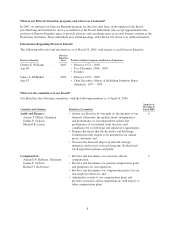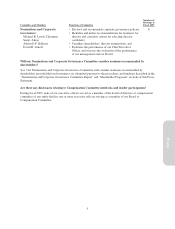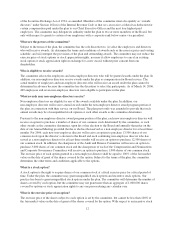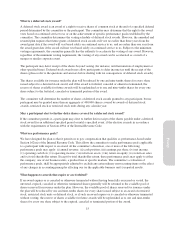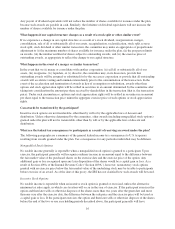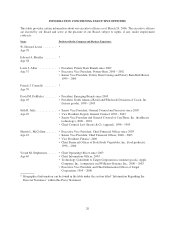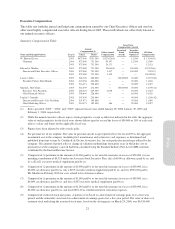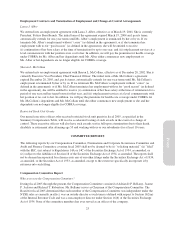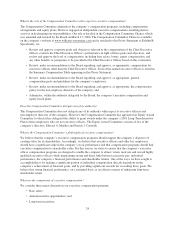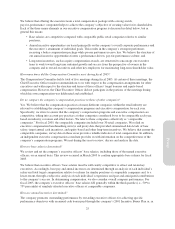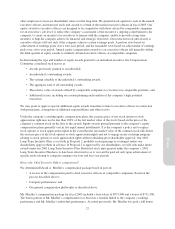Pottery Barn 2005 Annual Report Download - page 105
Download and view the complete annual report
Please find page 105 of the 2005 Pottery Barn annual report below. You can navigate through the pages in the report by either clicking on the pages listed below, or by using the keyword search tool below to find specific information within the annual report.
ordinary income at the time of the sale equal to the difference between the fair market value of the shares on the
exercise date, or the sale price, if less, and the exercise price of the option. Any additional gain or loss generally
will be taxable at long-term or short-term capital gain rates, depending on whether the participant has held the
shares for more than one year.
Restricted Stock
A participant will not recognize taxable income upon the grant of restricted stock unless the participant elects to
be taxed at that time. Instead, a participant generally will recognize ordinary income at the time of vesting equal
to the difference between the fair market value of the shares on the vesting date and the amount, if any, paid for
the shares. However, the recipient of a restricted stock award may elect, through a filing with the Internal
Revenue Service, to recognize income at the time he or she receives the award in an amount equal to the fair
market value of the shares underlying the award (less any cash paid for the shares) on the date the award is
granted.
Restricted Stock Units
A participant will not recognize taxable income upon grant of restricted stock units unless the participant elects
to be taxed at that time. Instead, the participant generally will recognize ordinary income at the time of vesting
equal to the fair market value of the shares on the vesting date less the amount, if any, paid for the shares.
Stock Appreciation Rights
A participant generally will not recognize taxable income upon the grant of a stock appreciation right. Upon
exercise, the participant generally will recognize ordinary income in an amount equal to the fair market value of
any shares received. Any additional gain or loss recognized upon any later disposition of the shares would be a
capital gain or loss. As a result of Section 409A, however, stock appreciation rights granted with an exercise
price below the fair market value of the underlying stock may be taxable to the participant before exercise of an
award. As of the date of this proxy, how such awards will be taxed is unclear.
Dividend Equivalents
A participant generally will recognize ordinary income each time a dividend is paid pursuant to the dividend
equivalent in an amount equal to the fair market value of the dividend received. If the dividends are deferred,
additional requirements must be met to ensure that the dividend is taxable upon actual delivery of the shares,
instead of the grant of the dividend.
Deferred Stock Awards
A participant generally will not have taxable income upon the grant of a deferred stock award. Instead, a
participant generally will recognize ordinary income at the time of the receipt of the shares subject to the award
equal to the difference between the fair market value of the shares at the time of receipt and the amount, if any,
paid for the shares. However, a participant will be subject to employment taxes (FICA and, where applicable,
state disability insurance taxes) at the time a deferred stock award vests, even if the participant has not yet
received the shares subject to the award. We do not guarantee the federal or state income tax treatment of the
deferred amounts. If the Internal Revenue Service successfully asserts that the deferral was ineffective, the
recipient could be liable for taxes, interest and penalties. In addition, the recipient could be liable for additional
penalties and interest as a result of Section 409A.
What are the tax effects to us as a result of grants of awards under the plan?
We generally will be entitled to a tax deduction in connection with an award under the plan in an amount equal to
the ordinary income realized by a participant at the time the participant recognizes such income, such as when a
participant exercises a nonqualified stock option. Special rules limit the deductibility of compensation paid to our
Chief Executive Officer and to each of our four most highly compensated executive officers. Under
17
Proxy



